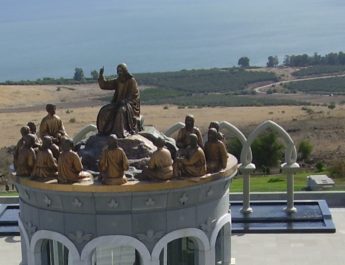Wisdom of Solomon 9:1-6, 9-11
A Women’s Lectionary Christmas Day
Text https://www.bible.com/bible/303/WIS.9.CEVDCI
Interlinear https://biblebento.com/index.html?lxx1i&270.9.1
1 MercifulA LordB GodC
of my ancestors,D
A “merciful” = eleos. This is mercy, pity, tender mercy, or compassion, whether from humans or from God. This is mercy, generally understood in action by word or deed. When we sing or say “kyrie eleison” (Lord, have mercy), it is related to this word.
B “Lord” = Kurios. From kuros (authority, supremacy). This is a respectful address meaning master or sir. It refers to one who has control or power greater than one’s own. So, it was also applied to God and Jesus as Master or Lord.
C “God” = Theos. From Proto-Indo-European origins, meaning do, put, place. This is God or a god in general.
D “ancestors” = pater. This is father in a literal or figurative sense. Could be elder, senior, ancestor, originator, or patriarch.
you createdE everythingF
by your word.G
E “created” = poieo. This is to make, do, act, construct, abide, or cause.
F “everything” = pas. This is all or every.
G “word” = logos. From lego (to speak, tell, mention). This is word, statement, speech, analogy. It is a word that carries an idea or expresses a thought, a saying. It could refer to a person with a message or reasoning laid out in words. By implication, this could be a topic, line of reasoning, or a motive. It can be used for a divine utterance or as Word – Christ.
2 And by your Wisdom,H
youI let us humansJ ruleK
Lall other creatures.M
H “Wisdom” = Sophia. From sophos (wise, clever, skilled, learned, cultivated); related to saphes (clear). This is skill, wisdom, insight, intelligence, clarity. It is wisdom as applied through a practical skill or shrewdness. It is not thoughtfulness or the mere gaining of intelligence for its own sake. Sophia is wisdom in action for everyday living.
I {untranslated} = kataskeuazo. 11x in NT. From kata (down, against, among, throughout) + skeuazo (to prepare using a tool); {from skeuos (tool, container, property, goods)}. This is to prepare, build, or ordain. It denotes preparing with the use of tools and with skill.
J “humans” = anthropos. Probably from aner (man, male, husband) + ops (eye, face); {from optanomai (to appear, be seen); perhaps from horao (become, seem, appear)}. This is human, humankind. Used for all genders.
K “rule” = despozo. From the same as despotes (lord, master, despot; authority who has unrestricted power and jurisdiction); {perhaps from deo (to tie, bind, compel; declare unlawful)} + posis (husband). This is to rule or dominate. It is related to “despot.” See https://en.wiktionary.org/wiki/%CE%B4%CE%B5%CF%83%CF%80%CF%8C%CE%B6%CF%89#Ancient_Greek
L {untranslated} = ginomai. This is to come into being, to happen, become, be born. It can be to emerge from one state or condition to another or is coming into being with the sense of movement or growth.
M “creatures” = ktisma. 4x in NT. From ktizo (to build, create, form, shape; God’s acts of creation); probably akin to ktaomai (to get, purchase, possess). This is something that was created – a creature or product.
3 We are to be honestN and fairO, P
N “to be honest” = diepo + ho + kosmos + osiotes. Diepo is to determine or govern. See https://en.wiktionary.org/wiki/%CE%B4%CE%B9%CE%AD%CF%80%CF%89#Ancient_Greek Kosmos is Perhaps from the base of komizo (to carry, convey, recover); from komeo (to take care of). This is order, the world, the universe, including its inhabitants. Literally, this is something that is ordered so it can refer to all creation. It can also refer to decoration in the sense that something is better ordered and, thus, made more beautiful. This is where “cosmos” and “cosmetics” come from. Osiotes is piety or holiness. See https://lexicon.katabiblon.com/?lemma=%E1%BD%81%CF%83%CE%B9%E1%BD%B9%CF%84%CE%B7%CF%82&diacritics=off
O “fair” = dikaiosune. From dikaios (correct, righteous – implies innocent; this is that which conforms to God’s notion of justice, uprightness); from dike (the principle of justice; that which is right in a way that is very clear; a decision or the execution of that decision; originally, this word was for custom or usage; evolved to include the process of law, judicial hearing, execution of sentence, penalty, and even vengeance; more commonly, it refers to what is right); may be from deiknumi (to show, point out, exhibit; figurative for teach, demonstrate, make known). This is judicial or divine approval of character or action. This is righteousness, justice, justness, divine righteousness.
P {untranslated} = euthutes + psuche. Euthutes is 1x in NT. From euthus (immediately, upright, straight and not crooked); {perhaps from eu (good, well, well done, rightly) + tithemi (to place, lay, set, establish)}. This is uprightness, straight, having justice. Litearlly, it is a straight path without meandering – direct and so righteous. Psuche is from psucho (to breathe, blow). This is breath, the breath of life, the self, individual, soul. This is the word for that which makes a person unique – their identity, will, personality, affections. This isn’t the soul as the immortal part of us, but as our individuality. It is also not life as a general concept, but specific to people. This is where the words psyche and psychology come from.
Q {untranslated} = krino. Related to “decision” in v3. See note R below.
R “decision” = krisis. From krino (to judge, decide, think good, condemn, determine, pass judgment, stand trial, sue; judging whether in court or in a private setting; properly, mentally separating or distinguishing an issue – to come to a choice or decision, to judge positively or negatively in seeking what is right or wrong, who is innocent or guilty; can imply trying, condemning, punishing, or avenging). This is a judging or a sentence. It is often used of God’s judgment, but can also be any accusation or condemnation. This is where the word “crisis” comes from.
S Literal word order – “and manage the world in responsibility and rightness and in straightness a soul and a decision judges.”
4 so shareT with me the Wisdom
that sits beside your throne,U
and let me beV a childW of yours.
T “share” = didomi. To give, offer, place, bestow, deliver. This is give in a literal or figurative sense.
U “throne” = thronos. Probably from thanos (bench); from thrao (to sit). This is throne or seat – the place where the king sits. So, it is used figuratively to mean power, dominion, or a potentate. This is where the word “throne” comes from.
V “be” = me + apodokimazo. Literally, “not cast away.” Apodokimazo is 9x in NT. From apo (from, away from) + dokimazo (to test, examine, prove; to approve after subjecting to a test to determine if it is real or acceptable; to test in a literal or figurative sense); {from dokimos (what passes the test, approved, acceptable, genuine, verified); from dechomai (to warmly receive, be ready for what is offered, take, accept, or welcome; to receive in a literal or figurative sense) or dokeo (to have an opinion, seem, appear, suppose; a personal judgment; to think); {from dokos (opinion)}}. This is rejected or disqualified following a test. It is rejected after rigorous investigation and so seen as useless or unworthy.
W “child” = pais. Perhaps from paio (to strike or sting). This is child, youth, servant, or slave.
5 My motherX was your servant,Y
and so am I—a mereZ human
whose life is short.AA
X “mother” = huios + paidiske. Huios is son, descendant – a son whether natural born or adopted. It can be used figuratively for other forms of kinship. Paidiske is related to “child” in v4. From pais (see note W above). This is young girl or female slave or servant.
Y “servant” = doulos. Related to “rule” in v2. Perhaps from deo (see note K above). This is used for a servant or for a slave, enslaved. It refers to someone who belongs to someone else. But, it could be voluntary (choosing to be enslaved to pay off debt) or involuntary (captured in war and enslaved). It is used as a metaphor for serving Christ. Slavery was not inherited (i.e. the children of slaves were not assumed to be slaves) and slaves could buy their way to freedom. Slavery was generally on a contractual basis (that is for the duration of how long it took you to pay your debt and/or save up enough money to buy your freedom).
Z “mere” = asthenes. From a (not) + sthenes (strong, vigor); {from the base of sthenoo (to strengthen so that one can be mobile); from sthenos (strength)}. This is without strength so weak, sick, helpless, frail, feeble. It can also be unimpressive or impotent. It can be used for physical or moral weakness.
AA “life is short” = oligochronios. From oligos (few, small, short, brief, puny) + chronos (time in the chronological sense, quantitative time, a duration of time). This is short-lived or lasting a small amount of time. See https://hellas.bab2min.pe.kr/hk/oligoxronios?l=en&form=oligoxronion
I understandBB only a littleCC
about lawsDD and judgments,EE
BB “understand” = sunesis. 7x in NT. From suneimi (to put together – used figuratively to mean understand, consider, gain insight; this is bringing together facts or notions and synthesizing them into a whole; making a summary to arrive at a final conclusion that includes how to apply the insight to life; it can also imply acting piously or being wise); from sun (with, together with) + hiemi (to send, put). This is understanding, cleverness, intelligence, knowledge, or insight. Just as the root verb, it is synthesized reasoning that brings facts together to understand indirect truths from the facts at hand.
CC “little” = elasson. 4x in NT. From the same as elachistos (smallest or littlest in the sense of size, amount, rank, dignity, and so on); from elachus (short); used as a superlative for mikros (small). This is smaller, worse, younger, lesser quality.
DD “laws” = nomos. From nemo (to parcel out). Literally, this is that which is assigned. It can be usage, custom, or law. This word can be used for human or divine law. It can be used specifically for the law of Moses or as a name for the Torah (the first five books of the Bible). Sometimes it is used for scripture as a whole, used of the Gospel, or of any theology. It is also used for the “tradition of the elders,” which would be the oral Torah – the tradition of the laws plus their interpretations as they were passed down over time. We must carefully consider which meaning of “law” is meant when we interpret passages the word is found in.
EE “judgments” = krisis. Same as “decision” in v3. See note R above.
6 because evenFF a perfectGG, HH human
isII really nothing
withoutJJ Wisdom from you.
FF {untranslated} = eimi. This is to be or exist.
GG “perfect” = teleios. 19x in NT. From telos (an end, aim, purpose, completion, end goal, consummation, tax). This is going through the steps to complete a stage or phase and then moving on to the next one. This is reaching an end and so being complete or “perfect.” It is also full grown or mature.
HH {untranslated} = huios. Same as “mother” in v5. See note X above.
II “is” = logizomai. Related to “word” in v1. From logos (see note G above). This is this is to compute or reckon up, to count; figuratively, it is coming to a conclusion or decision using logic; taking an inventory in a literal or figurative sense.
JJ “without” = apeimi. Related to {untranslated} in v6. From apo (from, away from) + eimi (see note FF above). This is to be away, without, absence.
9 Wisdom has always been with you.
She knowsKK your mighty deeds,LL
and she was thereMM
when you created the world.NN
KK “knows” = eido. This is to know, consider perceive, appreciate, behold, or remember. It means seeing with one’s eyes, but also figuratively, it means perceiving – seeing that becomes understanding. So, by implication, this means knowing or being aware.
LL “mighty deeds” = ergon. From ergo (to work, accomplish, do). This is work, task, deed, labor, effort.
MM “was there” = pareimi. Related to {untranslated} in v2 & “without” in v6. From para (by, beside, in the presence of) + eimi (see note FF above). This is to be near, arrive, be there.
NN “world” = kosmos. Same as “to be in honest” in v3. See note N above.
Wisdom knowsOO what pleasesPP you,QQ
and she knows what is rightRR
according to your commands.SS
OO “knows” = epistamai. 14x in NT. From epihistemi (to stand upon, be present, stand by, be urgent; to attack, confront, appear); {from epi (on, upon, against, what is fitting) + histemi (to stand, place, set up, establish, stand ready, stand firm, be steadfast)}. This is to know, stand on, get knowledge face to face or with personal effort, comprehend, be acquainted. It is related to “epistemology.”
PP “pleases” = arestos. 4x in NT. From aresko (to please or be agreeable; implies voluntarily serving others, satisfying others, or making good to win their favor or approval; often used for moral agreement; being agreeable or trying to be agreeable); perhaps from airo (raise, take up, lift, remove). This is what is pleasing, satisfactory, or desirable. It can also be satisfactory because it is moral.
QQ “you” = ophthalmos. Literally, “in your sight.” Related to “humans” in v2. From optanomai (see note J above). This is eye or sight. It is used figuratively for the mind’s eye, a vision, or for envy.
RR “right” = euthus. Related to {untranslated} in v3. 8x in NT. See note P above.
SS “commands” = entole. From entellomai (to charge, command, give orders or instructions) {from en (in, on, at, by, with) + tellomai (to accomplish); {from telos (an end, aim, purpose, completion, end goal, consummation, tax; going through the steps to complete a stage or phase and then moving on to the next one)}}. This is an order, command, ordinance, or law. It focuses on the purpose of the command and its end result.
10 SoTT from your gloriousUU and holyVV
throne in the heavens,WW
TT {untranslated} = exapostello. 13x in NT. From ek (from, from out of) + apostello (to send, send away, send forth as a messenger, to commission); {from apo (from, away from) + stello (to set, arrange, prepare, provide for)}. This is to send away, dismiss, send someone for a mission.
UU “glorious” = doxa. Related to “be” in v4. From dokeo (see note V above). This is literally something that evokes a good opinion – something that connects to our understanding of intrinsic worth. The ultimate expression of this is, of course, God and God’s manifestation. So, this is opinion, honor, and dignity, but also praise, glory, renown, and worship.
VV “holy” = hagios. From hagnos (holy, sacred, pure ethically, ritually, or ceremonially; prepared for worship, chaste, unadulterated, pure to the core; undefiled by sin; figurative for innocent, modest, perfect). God is totally different from humanity and thus set apart. That which is consecrated to worship God (elements of worship) or to serve God (as the saints) are holy because they are now set apart for God’s purposes. Holy because important to God. This is sacred physically, pure. It can be morally blameless or ceremonially consecrated.
WW “heavens” = ouranos. May be related to oros (mountain, hill) with the notion of height. This is the air, the sky, the atmosphere, and heaven. It is the sky that is visible and the spiritual heaven where God dwells. Heaven implies happiness, power, and eternity.
please sendXX Wisdom
to workYY besideZZ me and teachAAA me
what is pleasingBBB to you.
XX “send” = pempo. This is to send, put forth, or dispatch. This often refers to a temporary errand. It is sending someone with a focus on the place they departed from. By contrast, another Greek word, hiemi, emphasizes the destination and yet another word, stello, focuses on the motion that goes with the sending.
YY “work” = kopiao. From kopos (labor that leads to exhaustion, depletion, weariness, fatigue; working until worn out); from kopto (to cut, strike, cut off; beating the chest to lament and so to mourn). This is working with effort, whether of the body or mind, growing weary, feeling tired, working hard.
ZZ “beside” = sumpareimi. Related to {untranslated} in v2 & “without” in v6 & “was there” in v9. 1x in NT. Form sun (with, together with) + pareimi (see note MM above). This is to be present, to be arriving together.
AAA “teach” = ginosko. This is to know, recognize, realize, perceive, learn. It is knowledge gained through personal experience.
BBB “pleasing” = euarestos. Related to {untranslated} in v3 & “right” and “pleases” in v9. 9x in NT. From eu (see note P above) + aresko (see note PP above). This is literally well-pleasing – often used of something that is pleasing or acceptable to God.
11 WisdomCCC will guideDDD me
in all that I do,EEE, FFF
and her glory will guardGGG me,
because she knowsHHH everything.
CCC “wisdom” = suniemi. Related to “understand” in v5. From sun (with, together with) + hiemi (see note BB above). This is to put together – used figuratively to mean understand, consider, gain insight. It is bringing together facts or notions and synthesizing them into a whole. It is making a summary to arrive at a final conclusion that includes how to apply the insight to life. It can also imply acting piously or being wise.
DDD “guide” = hodegeo. 5x in NT. From hodegos (leader or guide; figuratively, a teacher); {from hodos (way, road, path, or journey; can imply progress along a route) + hegeomai (to think, suppose, have an opinion; to lead the way, what comes in front or first, initial thought, high esteem or authority; one who commands in an official capacity); {from ago (lead, bring, carry, drive, go)}. This is to guide or instruct. It is showing someone else the way, whether literally or figuratively.
EEE “do” = praxis. 6x in NT. From prasso (to do or practice – something done on an on-going basis or by habit; to accomplish, attend, or commit). This is an action, deed, business, practice, or function. It implies ongoing activity or responsibility.
FFF {untranslated} = sophronos. 1x in NT. From sophron (temperate, self-controlled, sound because in balance); {from the same as sozo (to save, heal, preserve, or rescue; taking someone from danger to safety; delivering or protecting literally or figuratively); {from sos (safe, rescued, well)} + phren (diaphragm, heart, intellect, understanding; figurative for personal opinion or inner mindset; thought regulating action; sympathy, feelings, cognition); {perhaps from phrao (to rein in or curb)}}. This is soberly, prudently. It is something donw with self-control or a sound mind.
GGG “guard” = phulasso. This is to guard something so that it doesn’t escape – to watch over it vigilantly. This is being on guard in a literal or figurative sense.
HHH “knows” = eido. Same as “knows” in v9. See note KK above.
Note: I was not able to use my regular website for this scripture passage so I am slightly less confident of its accuracy. However, the sites that I used for this are noted above.
Image Credit: “Mama” by Michelle MacPhearson, 2003.




